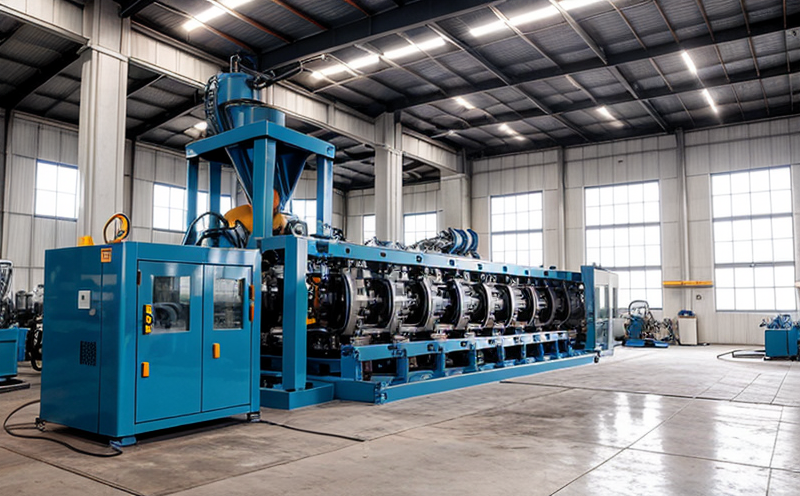ISO 10791 Machining Center Performance Testing
The ISO 10791 standard is widely recognized as a cornerstone in the evaluation of machining centers. This test ensures that machining centers meet the specified performance requirements, ensuring reliability and precision in manufacturing processes across various industries. The testing procedure involves a series of critical assessments including, but not limited to, dimensional accuracy, surface finish, cutting performance, and repeatability.
Quality managers and compliance officers can rely on this service to guarantee that the machinery they procure meets international standards. For R&D engineers and procurement teams, this ensures that new equipment is capable of meeting future demands in terms of precision, speed, and efficiency. The testing process involves a comprehensive series of steps aimed at providing detailed insights into the machining performance of centers.
The procedure begins with rigorous setup of the machine to ensure it operates under controlled conditions. This includes calibrating cutting tools, verifying the accuracy of spindle alignment, and establishing consistent coolant flow rates. Once the equipment is prepared, a series of predefined tests are conducted using specific ISO 10791 test methods.
The dimensional accuracy checks involve measuring critical dimensions after machining operations to ensure that they fall within specified tolerances as outlined in the standard. Surface finish testing evaluates the quality of the machined surface for its smoothness and flatness, which is crucial for applications requiring high precision. Cutting performance tests assess the speed at which cuts can be made without compromising on accuracy or causing tool wear.
Repeatability tests are conducted to ensure that every machining operation produces consistent results. This is achieved by making multiple passes over a test specimen and comparing the outcomes. The results of these tests provide detailed insights into the machine's precision, durability, and overall performance. Compliance with ISO 10791 ensures reliability in manufacturing processes.
The testing process is not just about meeting standards; it also involves providing comprehensive reports that detail all aspects of the test procedure. These reports are invaluable tools for quality assurance teams as they help identify areas where improvements can be made to enhance performance or reduce downtime. For procurement teams, these reports serve as a reliable benchmark against which new equipment can be compared.
By adhering strictly to ISO 10791 standards, manufacturers and processors can ensure their operations are efficient, cost-effective, and environmentally sustainable. This service plays a pivotal role in maintaining high-quality manufacturing processes across various industries including automotive, aerospace, and electronics.
- Incorporating ISO 10791 machining center performance testing ensures compliance with international standards.
- Enhances the reliability and precision of manufacturing processes across multiple sectors.
- Provides detailed reports that are essential for quality assurance teams.
- Assists in identifying areas for improvement to enhance performance and reduce downtime.
- Serves as a reliable benchmark against which new equipment can be compared.
Applied Standards
The ISO 10791 standard is integral to the evaluation of machining centers, ensuring that they meet specified performance requirements. This standard is widely recognized for its rigorous approach in assessing various aspects of a machining center's operation.
The standard covers several key areas including dimensional accuracy, surface finish, cutting performance, and repeatability. Each of these areas plays a crucial role in determining the overall performance of a machining center. Dimensional accuracy ensures that parts are manufactured to precise specifications, while surface finish testing evaluates the quality of the machined surface for its smoothness and flatness.
Cutting performance tests assess the speed at which cuts can be made without compromising on accuracy or causing tool wear. Repeatability tests ensure consistency in every machining operation, producing consistent results every time. Compliance with ISO 10791 ensures reliability in manufacturing processes across various industries.
The standard also outlines specific test methods and procedures that must be followed during the testing process. This includes detailed instructions on how to set up the machine for testing, what parameters should be measured, and how to interpret the results. By adhering strictly to these standards, manufacturers can ensure their operations are efficient, cost-effective, and environmentally sustainable.
The application of ISO 10791 in industrial manufacturing and processing testing is crucial for ensuring that machining centers meet international quality requirements. This standard provides a reliable benchmark against which new equipment can be compared, helping to identify areas for improvement. For quality managers and compliance officers, this service ensures that the machinery they procure meets stringent performance criteria.





